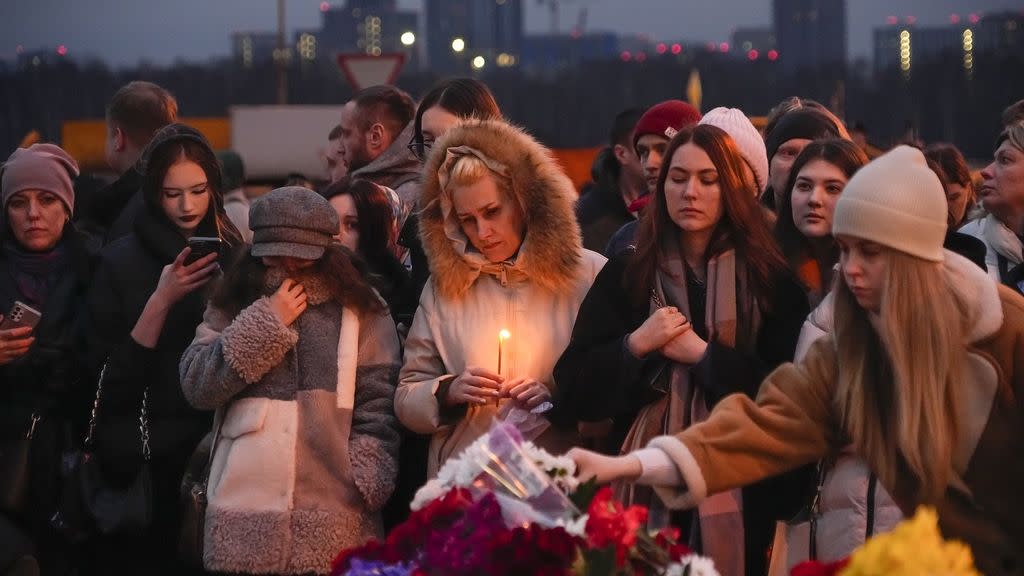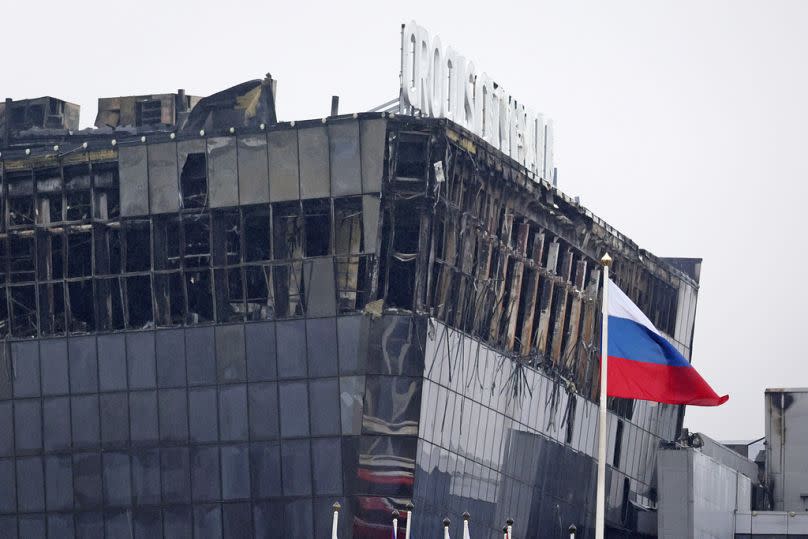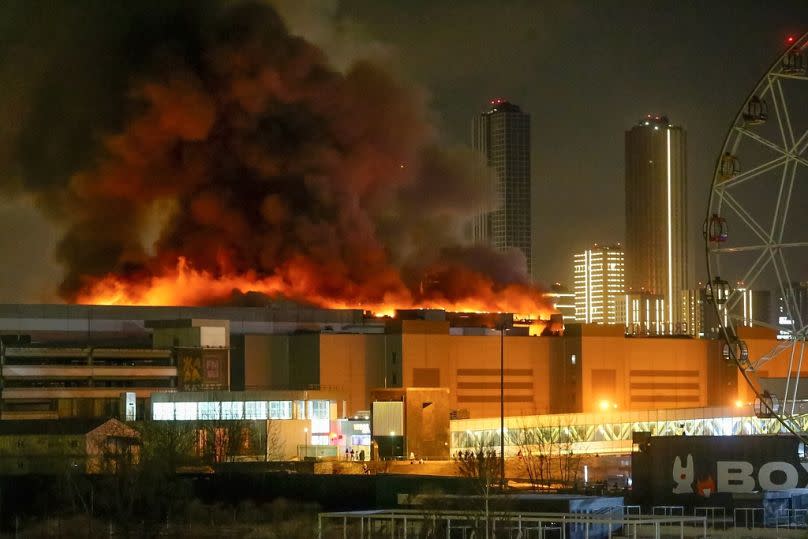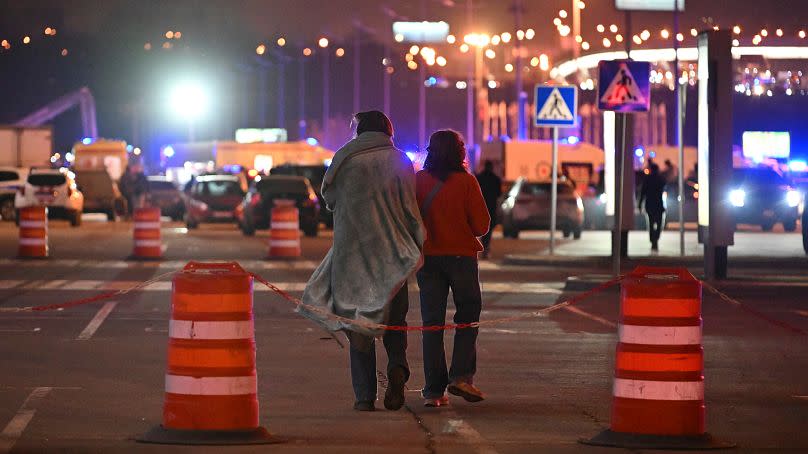Moscow concert attack: Russia mourns as death toll hits 137

Russia observed a national day of mourning on Sunday, after at least 137 people were killed and more than 140 wounded in an attack on a packed concert hall in Moscow.
On Friday, a group of gunmen dressed in combat gear stormed the Crocus City Hall in the west of the Russian capital and sprayed crowds with gunfire, leaving the venue smouldering with a collapsed roof.
Vladimir Putin said all four assailants had been arrested, declaring Sunday a day of national mourning.
Events across the country were cancelled on Sunday, with flags at half-mast and TV entertainment suspended, Russian state news agency RIA Novosti reported.
Flowers have piled up at a memorial near the wrecked concert hall.
Russia's president on Saturday made an unsubstantiated claim that Kyiv may have been involved in the attack as the suspects were trying to flee to Ukraine.
Kyiv blasted allegations of Ukrainian involvement as "absurd".
The Islamic State claimed responsibility for the bloodbath in a social media post, saying it attacked a large gathering of “Christians” in Krasnogorsk on Moscow’s outskirts.
US intelligence agents knew the terror group's branch in Afghanistan was planning an attack in Moscow, sharing this information with Russian officials, the AP news agency reported.

Rescue operations have "ceased", but searches continue, according to authorities, as hundreds of Moscovites have lined up to donate blood to those injured.
Some still do not know if their loved ones who went to the event are alive.
Russian security services say they have detained eleven foreign nationals in connection to the attack.
In a speech on Saturday, Putin said: "The criminals were cold-blooded and purposefully going to kill, shoot our citizens and our children at point-blank range.
"They tried to hide and moved towards Ukraine, where, according to preliminary data, a window was prepared for them from the Ukrainian side to cross the state border.
"Whoever they are, whoever is guiding them. I repeat: we will identify and punish everyone who stands behind the terrorists," he added.
Kyiv has strongly denied any involvement, concerned the Kremlin will use the attack to escalate the war.
"Ukraine certainly has nothing to do with the shooting/explosions in the Crocus City Hall (Moscow Region, Russia)," wrote Mykhailo Podolyak, an adviser to the Ukrainian president on X. "It makes no sense whatsoever."
"Everything in this war will be decided only on the battlefield...Terrorist attacks do not solve any problems," he continued.
The assault occurred just days after Putin cemented his grip on the country in a highly orchestrated electoral landslide.
Some commentators on Russian social media questioned how authorities, who relentlessly surveil and pressure Kremlin critics, failed to identify the threat and prevent the grisly assault.
According to Interfax, a group of men began shooting both at the building's entrance and within the hall, where numerous attendees were present for a "Picnic" rock group concert. The band were unharmed.
Videos recorded by eyewitnesses audibly captured the machine gun fire, while others show men shooting screaming people at point-blank range.
“There were volleys of gunfire,” Dave Primov, who was in the hall during the attack, told AP. “We all got up and tried to move toward the aisles. People began to panic, started to run and collided with each other. Some fell down and others trampled on them.”
News reports said the assailants threw explosives, which sparked a massive blaze in the concert hall and caused the roof to collapse.

The casualty count from the incident has continued to rise throughout Saturday morning, with the Investigative Committee detailing that 133 people were killed.
Health authorities released a list of 145 injured - 115 of them hospitalised, including five children.
People around the world have paid tribute to the victims of the attack, laying flowers outside of embassies in several countries.
Following the deadly armed assault, Moscow's Mayor Sergei Sobyanin announced the cancellation of all public events scheduled for the weekend in the city.
Russian authorities said security has been tightened at Moscow’s airports and railway stations.
Belarusian leader Aleksandr Lukashenko, in a message to Putin, vehemently denounced the “brutal murder of innocent people,” a sentiment echoed by Kazakh President Tokayev, who also offered support to Russian law enforcement.
Western leaders have echoed condemnation of the attack, the deadliest in Russia in two decades.
Several Russian politicians have called for the death penalty for terrorism to be revised, meanwhile.
Capital punishment is currently legal in Russia but has not been used since 1996 due to a moratorium.
Mikhail Sheremet, a member of the State Duma, told Russian news agency RIA Novosti he intended to initiate the issue of the death penalty for "terrorists".
Vladimir Vasilyev, the leader of the "United Russia" fraction in the State Duma seconded the statement.

The shooting is the deadliest on Russian soil in around 20 years, though Russia has suffered many terrorist attacks in recent history.
In October 2015, a bomb planted by the Islamic State downed a Russian passenger plane over Sinai in Egypt, killing all 224 people on board - mostly Russian holidaymakers.
The group, which operates in Syria, Iraq, Afghanistan and Africa, has claimed several attacks in Russia’s volatile Caucasus and other regions in the past years. It recruited fighters from Russia and other parts of the former Soviet Union.
The White House offered its sympathies to the victims and their families in light of the attack.


